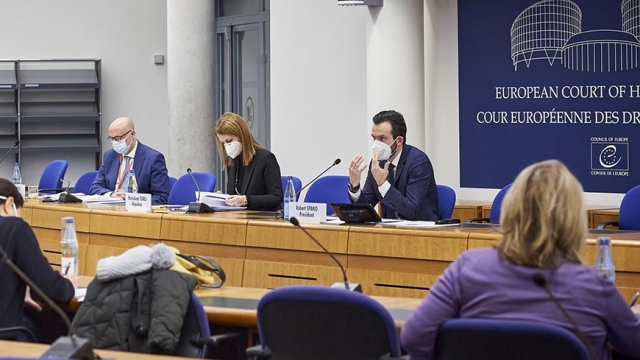European Court 2020 Statistics and Notes on Georgia
Increased polarisation and challenges to Europe’s fundamental principles, together with the global COVID-19 pandemic, are likely to create the most difficult period we have seen in many years, according to the President of the European Court of Human Rights (ECHR). Speaking at the court’s annual press conference in Strasbourg, ECHR President RobertSpano said that democracy, the independence of the judiciary and the rule of law are increasingly being called into question at both the European and global levels.
He added that the on-going pandemic has already raised a number of important human rights issues, including the proportionality of measures taken by Council of Europe member states, the legal basis of those measures and the use of domestic procedures to sanction actions or inaction. President Spano underlined that the ECHR has been able to continue its work despite the pandemic, deciding on over 39,190 applications in 2020 and holding online public hearings for the first time.
Nevertheless, there were approximately 62,000 applications pending before the ECHR at the end of 2020. 70% of those applications related to just four Council of Europe member states – Russia (13,650), Turkey (11,750), Ukraine (10,400) and Romania (7,550). President Spano highlighted the success of changes to the ECHR’s working methods in reducing the backlog of pending cases and said that the Court’s priority policy would be further strengthened to help reduce timescales. The President also stressed the binding and unequivocal obligation of each Council of Europe member state to implement ECHR judgments, which he said was fundamental to the system and “crystal clear” from a legal point of view.
ECHR annual report for 2020
Notes for GEORGIA
Statistics: allocated, decided and pending applications
- 41,700 applications were allocated to a judicial formation in 2020, compared to 44,500 in 2019, a decrease of 6% (p. 155)
For Georgia, 130 new applications were allocated to a judicial formation, almost equal to 131 in 2019 (p. 160).
- The states with the highest number of applications allocated to a judicial formation in proportion to population size (not including micro-states) were:
- Montenegro (3.50 applications per 10,000 population)
- Serbia (2.65)
- Bosnia and Herzegovina (2.49)
- Latvia (2.17)
- Romania (1.55)
This indicator for Georgia was 0.35 applications per 10,000 population, well below the European average of 0.5.
- 7,681 applications were formally communicated to member states in 2020, compared to 6,442 in 2019, an increase of 19%
For Georgia, 7 applications were communicated to the authorities in 2020, as compared to 17 in 2019.
- The ECHR decided a total of 39,190 applications in 2020, compared to 40,667 in 2019, a decrease of 4%.
- Of the 39,190 applications decided in 2020, 1,901 (4.85%) were decided by a judgment and 37,289 (95.15%) were declared inadmissible or struck out.
For Georgia, the European Court has delivered judgments on 18 applications in 2020, as compared to 14 applications in 2019.
- There were 62,000 applications pending on 31/12/20, compared to 59,800 on 01/01/20, an increase of 4%. (p. 156)
- The ten states with the highest number of cases pending were Russia (13,645), Turkey (11,750), Ukraine (10,408), Romania (7,561) and Italy (3,469), followed by Azerbaijan (2,040), Serbia (1,755), Armenia (1,407), Poland (1,156) and the Republic of Moldova (1,054). The other 37 member states combined accounted for around 7,800 pending cases [p158]
There were 532 applications pending against Georgia in 2020.
Violations by subject matter and by country (pp. 162-163)
- In total, the ECHR delivered 871 judgments in 2020; of those, 762 (87.49%) found at least one violation of the convention and 84 (9.64%) found no violation
- The states with the highest number of judgments finding at least one violation in 2020 were:
- Russia (173 judgments)
- Turkey (85)
- Ukraine (82)
- Romania (64)
- Azerbaijan (37)
- Bulgaria (35)
There were 15 judgments delivered on Georgia in 2020, and in 12 out of them at least one violation was found.
- The articles of the convention giving rise to the most violations were those concerning the right to a fair trial (287), the right to liberty and security (208), the prohibition of torture and inhuman or degrading treatment (194), the protection of property (122), the right to life and the right to an effective remedy (both 85); other articles accounted for 286 violations [p. 159].
For Georgia, the right that was violated the most was the right to a fair trial (4 judgments), followed by the lack of effective investigation (3 judgments) and the prohibition of inhuman and degrading treatment (3 judgments).
Violations by article and state, 1959-2020 [p164-165]
- In total, the ECHR delivered 23,406 judgments between 1959 and 2020; of those, 19,739 (84.3%) found at least one violation of the convention and 1,893 (8.01%) found no violation
- The states with the highest number of judgments finding at least one violation between 1959 and 2020 were:
- Turkey (3,309)
- Russia (2,724).
- Italy (1,857)
- Ukraine (1,465)
- Romania (1,393)
For Georgia, 95 judgments finding at least one violation were delivered from 1959 to 2020. The right to a fair trial was violated the most (in 31 judgment, i.e. every 3rd).
- The issues giving rise to the most violations between 1959 and 2020 were:
- Length of proceedings (5,950)
- Right to a fair trial (5,276)
- Right to liberty and security (4,190)
- Protection of property (3,592)
- Right to an effective remedy (2,719)












